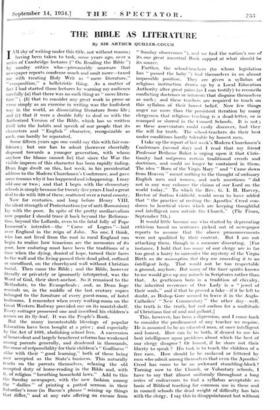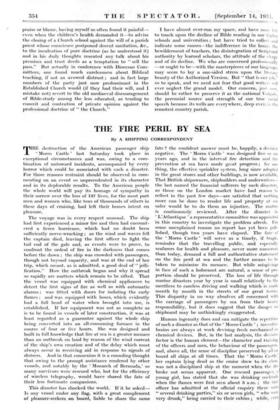THE BIBLE AS LITERATURE
By SIR ARTHUR QUILLER-COUCH AM shy of writing 'under this title, not without reason; I having been taken to task, some years ago, over a series of Cambridge lectures (" On Reading the Bible ") j, sundry critics who—presumably -unaware that newspaper reports condense much and omit more--taxed me with treating Holy Writ as " mere literature," " composition," a belletristic - thing. -As a matter of fact I had started.those lectures by warning my audience carefully (a) that there was no such thing as " mere litera- ture " ; (b) that to consider any great Work in prose or verse simply as an exercise in writing was the toolishest way in the world, as dissociating literature from life ; and (c) that it were a double folly to deal so with the Authorized Version of the Bible, which has so written itself into the habits and speech of our -people that its characters and " English " character, recognizable as such, can hardly be separated.
Some fifteen years ago one could say this with fair con- fidence ; but one has to admit (however cheerfully disposed towards a younger generation, with whom anyhow the blame cannot lie) that since the War the visible impress of this character has been rapidly fading. Dean Inge dwelt on this, last week, in his presidential address to the Modern Churchmen's Conference, and gave some reasons why it has happened and is happening. I may add one or two ; and that I begin with the elementary schools is simply because for twenty-five years I had a great deal to do with 320 of these, scattered over a rural county.
Now for centuries, and long before Henry VIII, the silent strength of Protestantism (or of anti-Romanism) lay with the poor. In spite of the pretty mediaevalism now popular I should trace it back beyond the Reforma- tion, beyond the Lollards, even to the fatal folly of Pope Innocent's interdict—the " Curse of Logres "—laid over England in the reign of John. No one, I think, who has not lived from the root in rural England can begin to realize how tenacious are the memories Of its poor, how enduring must have been the traditions of a time when the dying, denied of hope, turned their faces to the wall and the living passed their dead piled, coffined or uncoffined, on the churchyard wall without Christian burial. Then came the Bible ; and the -Bible, however literally or privately or ignorantly interpreted, was the Word of God, their sheet-anchor. So it remained to the Methodists, to the Evangelicals ; and, as Dean Inge reminds us, in the middle of the last century copies belonged to the furniture of every guest-room, of hotel bedrooms. I remember when every waiting-room on the Great Western Railway. provided one on its mantel-shelf. Every cottager possessed one and inscribed his children's names on its fly-leaf. It was the People's Book.
But the many incontestable blessings of popular Education have been bought at a price ; and especially by the Act of 1891, abolishing school fees. A succession of benevolent and largely beneficent reforms has weakened among parents generally, and deadened in thousands, the sense of responsibility for their children's " Godliness " alike with their " good learning," both of these being now • accepted as the State's business. This naturally reacts- on the parents themselves, relaxing the old accepted duty of home-reading in the Bible and, with it, of religion " breathing household laws." Add to this the Sunday newspaper, with the new fashion among the " dailies " of printing a potted sermon in their Saturday's issue (in Bacon's phrase " mixing up things that differ," and at any rate offering an excuse froth " Sunday observance "), and we find the nation's use of its one great ancestral Book sapped at what should be its source.
Further, the school-teachers (to whom legislation has " passed the baby ") find themselves in an almost impossible position. They are given a syllabus of religious instruction drawn up by a Local Education Authority after great pains (as I can testify) to reconcile conflicting doctrines or interests that disguise themselves as such ; and these teachers are required to teach on this syllabus of their honest belief. Now few things anger me more than the persistent iteration by many clergymen that religious teaching is a dead-letter, or is scamped or slurred in the Council Schools. It is not ; as these asseverators could easily discover, had they the will for truth. The school-teachers do their best under conditions hardly tolerable by honest men.
I take up the report of last week's Modern Churchmen's Conference (second day) and I read that my friend Professor Bethune Baker is urging upon it that Chris- tianity had outgrown certain traditional creeds and doctrines, and could no longer be contained in them. The idea " Born of the Virgin Mary " and " Came down from Heaven " meant nothing to the thought of ordinary English men and women, and such assertions " did not in any way enhance the claims of our Lord on the world today." To which the Rev. G. I. H. Harvey, Rector of Sutton Coldtield. would seem to have added that " the practice of reciting the Apostles' Creed con- duces to heretical views which are keeping thoughtful and intelligent men outside the Church." (The Times; September 7th.) It would little become one who started by deprecating criticism based on sentences picked out of newspaper reports to assume that the above pronouncements were not qualified by their context. But I am not attacking them, though in a measure dissenting. [For instance, I hold that too many of our clergy arc in far too great a hurry to surrender the mystery of the Virgin Birth on the assumption that they are conceding it to an intelligent laity. That would not be too respectable a ground, anyhow. But many of the finer spirits known to-me would give up any miracle in Scriptures rather than that. As gentlemen born in a tradition of chivalry, the inherited reverence of Our Lady is a " jewel of their souls," and if that be proved a fake—if it be left to doubt, as Bishop Gorc seemed to leave it in the Anglo- Catholics' " New Commentary " the other day—well, the truth is the truth, but ruit coelurn for a multitude of Christians fine of soul and gallant.] This, however, has been a digression, and I come back to consider the predicament of any teacher we require. He is assumed to be an educated man, at once intelligent and honest. How can he be both, if denied to use his best intelligence upon problems about which the best of our clergy disagree ? Or honest, if he share not their liberty to speak ? His task is to teach the children of a free race. How should he be enslaved or fettered by men who admit among themselves that even the Apostles' Creed has come to be an awkward stumbling-block? Turning now to the Church, or Voluntary schools, I have to say that -almost uniformly throughout a long Series of- endeavours to find a syllabus acceptable as basis of Biblical teaching for common use in these and in council schools the dead weight of 'difficulty has lain with the clergy. I say this in disappointment but without praise or blame, having myself so often found it painful— even when the children's health demanded it—to advise the closing of a Church school against the will of a parish priest whose conscience postponed decent sanitation, &c., to the inculcation of pure doctrine (as he understood it) and in his daily thoughts resented any talk about his premises and trust deeds as a temptation to " sell the pass." But actually in conference with -Diocesan Com- mittees, one found much carelessness about Biblical teaching, if not an avowed distrust ; and in fact large numbers of the party just now predominant in the Established Church would (if they had their will, and I mistake not) revert to the old mediaeval discouragement of Bible-study among the less educated, as tending to conceit and contention of private opinion against the professional doctrine of " the Church," I have almost over-run my space, and have none kft to touch upon the decline of Bible reading in our higher schools and universities ; but have tried to collect and indicate some causes—the indifference in the home. the bewilderment of teachers, the disintegration of Scriptural authority by learned scholars, the attitude of the clergy and of its decline. -We who are concerned professionally —or ought to be—with the masterpieces of our language, may seem to lay a one-sided stress upon the literary beauty of the Authorized Version. But " that is our job," so to speak, and we need not fear that good -writers will ever neglect the grand model. Our concern, just now, should be rather to preserve it as the national Vulgate, the perennial source and strength of our true racial speech because its wells are everywhere, deep even ia the remotest country parish.











































 Previous page
Previous page